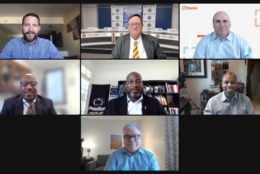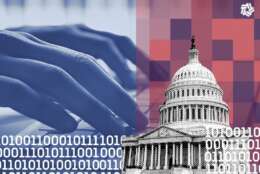Cybersecurity
-
16 of the 37 federal programs and governmentwide challenges on GAO’s 2023 high risk list improved, according to the latest biennial report the agency published Thursday.
April 20, 2023 -
Lots of things have days, like National Ice Cream Day. Lots of things have whole months, like USDA Invasive Plant Pest Month. So why not emergency communications? Emergency Communications Month is in fact going on right now.
April 19, 2023 -
After 21-year-old Jack Teixeira was arrested for allegedly leaking classified info, the Pentagon is looking at what it can do to prevent similar situations in the future.
April 17, 2023 -
During this exclusive webinar, you will learn how top government technology executives are implementing effective strategies and technology around zero trust.
April 17, 2023 -
Shane Barney, the chief information security officer at USCIS, and Miguel Adams, the Millennium Challenge Corporation’s CISO, both say the need to educate and train the business customers on zero trust is important to their agency’s success.
April 07, 2023 -
Modern digital tools, powered by IT, have become an integral part of our daily lives. These technologies have changed how we perform various tasks such as accessing information, planning trips, conducting business and communicating with others.
April 03, 2023 -
DoD hasn't yet weighed in with an official position on whether a notional "cyber force" should become a new seventh branch of the armed services, despite years of Congress asking.
April 03, 2023 -
There’s no denying identity access and management are critical to controlling federal assets, but we talk with VMware’s Don Bailey and Ingram Micro’s Tony Celeste about the importance of agencies adopting an enterprise security posture.
March 31, 2023 -
Agencies are honing in on how best to secure software and gain better visibility into their suppliers. We talk to leaders from DoD, FDA, GSA, NASA and State to reveal how agencies are meeting demands for visibility into their vendors’ cyber practices.
March 29, 2023 -
Current and former federal technology officials say the recent inspector general report on GSA’s Login.gov reinforced why working with the Technology Transformation Service continues to leave a sour taste in many agency’s mouths.
March 28, 2023 -
The United States Agency for International Development is focused on its modernization efforts for employees.
March 28, 2023 -
The U.S. government will restrict its use of commercial spyware tools that have been used to surveil human rights activists, journalists and dissidents around the world. President Joe Biden's order responds to growing U.S. and global concerns about programs that can capture text messages and other cellphone data. Some programs — so-called “zero-click” exploits — can infect a phone without the user clicking on a malicious link. While the U.S. and other governments routinely collect huge amounts of data, advocates warn that the commercial spyware market creates new opportunities for abuse and repression.
March 27, 2023 -
In today's Federal Newscast: A new House subcommittee chairman pledges to conduct rigorous oversight of CISA. All 44 Army installations institute the military housing Tenant Bill of Rights. And the White House is putting up $250 million to help make federal buildings more climate friendly.
March 24, 2023 -
As space fills its ranks with cyber and satellite specialists, it has to build out its training abilities.
March 23, 2023 -
CISA is working to identify a subset of critical infrastructure that underpin the economy, national security and public health and safety.
March 23, 2023















